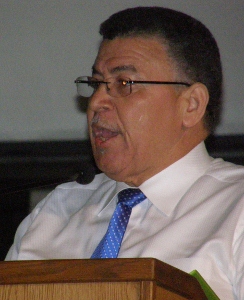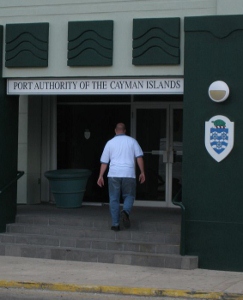 FOI
FOI

FOI appeals become more adversarial
 (CNS): In her latest quarterly report regarding the work of her office the Information commissioner has raised concerns that government departments are increasingly engaging lawyers to help them withhold records rather than trying to disclose them, as was intended by the Freedom of Information law. Jennifer Dilbert said that as the public becomes more aware of its rights under the law, the number and complexity of hearings and investigations being carried out by her officer is increasing but the process is becoming increasingly legalistic. Dilbert also reports that during the first quarter of 2012 her office handled a record number of appeals.
(CNS): In her latest quarterly report regarding the work of her office the Information commissioner has raised concerns that government departments are increasingly engaging lawyers to help them withhold records rather than trying to disclose them, as was intended by the Freedom of Information law. Jennifer Dilbert said that as the public becomes more aware of its rights under the law, the number and complexity of hearings and investigations being carried out by her officer is increasing but the process is becoming increasingly legalistic. Dilbert also reports that during the first quarter of 2012 her office handled a record number of appeals.
She said that between 1 January and 31 March twelve new appeal files were opened and two were closed, the largest number of appeals received in one quarter to date.
Dilbert explained that the hearings were becoming increasingly complex as cases naturally work their way through the system and she pointed to the non- or partial disclosure, procedural or legal questions, a lack of response from the public authorities as well as incorrect interpretation and unexplained applications as some of the issues her office was dealing with when handling appeals and hearings. She said that applicants may at times be unclear in the precise scope of their requests, further complicating the problems.
Dilbert pointed to the adversarial approach now adopted by some public authorities as they try to prevent the release of documents and information.
“An increasing number of public authorities engage legal counsel to deal with FOI requests, especially once an appeal has been raised,” Dilbert wrote in her report. “This puts additional pressure on the ICO as the approach becomes increasingly legalistic and adversarial, with a greater emphasis on withholding records, rather than maximum disclosure as intended in the Law,” she added.
According to the latest statistics, since the FOI law came into force in 2,295 requests for information have been filed with public authorities by members of the public by the end of March this year. In that time 90 appeals were opened by the ICO and 74 of them closed. Nineteen hearings have already been conducted and a twentieth is currently underway. During the last quarter of 2011, 193 Freedom of Information requests were logged by public authorities, representing a 69% increase in requests over the previous period and covered 58 out of the 91 public authorities.
However, Dilbert revealed that 25 public authorities failed to submit their information to the ICO before the deadline, despite reminders from the office. The commissioner said that authorities which continue to be non-compliant will be named in future quarterly reports.
Of the many other issues analysed in the report, Dilbert also writes that despite the legal requirement to review the freedom of information legislation and the formation of a review sub-committee, chaired by Attorney General Sam Bulgin, almost two years ago, there has been no progress on the law review.
See full quarterly report below and for more information visit www.infocomm.ky

Report exposes more failures
 (CNS): A UK expert who reviewed the Cayman Islands Public Management and Finance Law (PMFL) has pointed to the lack of consolidated government accounts as its biggest failing and urged government to rectify this problem with the closure of this year’s accounts as soon as possible. A report by Keith Luck, the former director general finance at the FCO, was released by the Governor’s Office on Friday following an FOI request by CNS and reveals further details of the failure of the Cayman government to account for its spending. Luck pointed to poor understanding and leadership and said the people of Cayman “are without their key controls” because of the failures, and recommended a radical simplification of the system.
(CNS): A UK expert who reviewed the Cayman Islands Public Management and Finance Law (PMFL) has pointed to the lack of consolidated government accounts as its biggest failing and urged government to rectify this problem with the closure of this year’s accounts as soon as possible. A report by Keith Luck, the former director general finance at the FCO, was released by the Governor’s Office on Friday following an FOI request by CNS and reveals further details of the failure of the Cayman government to account for its spending. Luck pointed to poor understanding and leadership and said the people of Cayman “are without their key controls” because of the failures, and recommended a radical simplification of the system.
“A significant concern is the absence of robust Departmental Accounts, but it is the lack of Consolidated Accounts for Government, let alone an Entire Public Sector (EPS) Account, that has to be the biggest failing. Without these the Government and people of the Cayman Islands are without their key controls,” Luck said in the executive summary of his comprehensive report. “My principal recommendation however is a strategy of radical simplification. This needs to begin alongside closure of this year’s accounts. It will require a rigorous and resolute focus on simplification, standardisation and burden reduction.”
The British bureaucrat said government had to get back to basics and then re-build, and strongly recommended that the extent to which outputs and output reporting are used to control and drive appropriations is seriously examined.
Luck found that IRIS, government’s core accounting and information system, had contributed to the difficulties in PMFL but these were symptomatic of wider governance issues. While accrual accounting was now embedded in the system, it was not fully implemented and “understanding is still low in some areas even amongst senior managers,” he said. Luck found that capital accounting still operates on a quasi-cash basis and compliance with International Accounting Standards was inconsistent.
Although less adjustment was required to the human resources element of government, he said that performance management was the biggest challenge and that reform would improve behaviour and outcomes across the civil service.
In his report Luck pointed to weaknesses in leadership and a lack of management sanctions, which meant no one was held to account for the failures. The lack of effective performance management and appraisal was an issue, along with the failure by management to properly delegate. “Some Ministries still double-check and micro-manage which adds to bureaucracy and reduces efficiency,” Luck stated.
The former FCO top accountant also revealed that the Public Sector Investment Committee (PSIC), which should oversee Capital Project Appraisals for all projects over CI$300,000, has never met, despite being mandated in Part XII and Schedule 5 of the Financial Regulations
Of the many observations Luck makes about the PMFL and the subsequent reforms of the system which have led to the pressing problems is the abject failure of government to publish its accounts.
“The most telling indictment of the reforms is the simple fact that the Government, regardless of the party in power, has been unable to fulfil its legal duty to lay accounts in the Legislative Assembly since the reforms were introduced. These missing individual Departmental and Consolidated accounts date back in some cases to July 2003,” he observed.
See the full Luck report below.

Political meetings cost public purse $21K
 (CNS): Three public meetings hosted by the premier and the UDP MLAs billed as updates on the port and projects but which many described as political rallies cost the public purse close to $22,000. A breakdown released by the ministry following an FOI request shows that the meetings which took place in George Town, East End and Bodden Town were funded by the public purse and not the UDP. Although the meetings were advertised as an opportunity for the public to hear the latest on government’s proposed projects, the meetings focused heavily on government’s critics and opponents. Very little new information was revealed about the plans for the George Town cruise port or the other major projects at any of the gatherings.
(CNS): Three public meetings hosted by the premier and the UDP MLAs billed as updates on the port and projects but which many described as political rallies cost the public purse close to $22,000. A breakdown released by the ministry following an FOI request shows that the meetings which took place in George Town, East End and Bodden Town were funded by the public purse and not the UDP. Although the meetings were advertised as an opportunity for the public to hear the latest on government’s proposed projects, the meetings focused heavily on government’s critics and opponents. Very little new information was revealed about the plans for the George Town cruise port or the other major projects at any of the gatherings.
During the meeting in East End, which cost government just over $5000, McKeeva Bush endorsed John McLean Jr, who plans to run in the district as an independent at the next general election, as the UDP’s preferred candidate. Bush also stirred up significant controversy when he said that he would be using money given to government by Dart under the ForCayman Investment Alliance deal to help McLean implement some local projects in the district, bypassing the East End incumbent and opposition MLA, Arden McLean.
At the Bodden Town meeting, the most expensive of all at over $9000 as government spent more than $6000 on advertising, a demonstration by campaigners opposing the relocation of Grand Cayman’s landfill to the district saw all of the MLAs, in particular the backbench UDP members, attacking the protestors from the podium but they gave no new details about the plans for the proposed waste-management project.
The first of the meetings, which took place in George Town and cost over $7000, also saw politics rather than the port take centre stage. Bush spoke for more than an hour and a half and made it clear that recent indications that he may be getting tired of the political fray did not mean he was going anywhere. Although wanting to see more young people step into politics, he said he was continuing on and would run in the next election. The speech heavily condemned his opponents, both in the legislature and in the community, as he accused the agitators of endangering the country.
All three meetings were seen as highly political, bringing into focus the argument raised by Bush himself when he was in opposition about governments spending public money on promoting themselves while in office and the fine line between a public update by government and a party political rally. During the previous government Bush criticised the then PPM administration for spending money on televised press briefings.
See FOI release and the breakdown of the public meeting costs below.
See advertisement promoting the George Town meeting here.

Ryan tied debt to Dragon Bay
 (CNS): Correspondence between government and the developer of the Ritz-Carlton, Grand Cayman shows that Michael Ryan, the owner of various companies related to the Ritz development and the proposed Dragon Bay development, wanted to tie his repayment of duty on the hotel to future plans for that project. The results of an FOI requests made by CNS reveal that, despite government’s efforts to collect the money owed to the public purse, the developer was trying to leverage the debt to gain further concessions on Dragon Bay, as well as other issues regarding what he called the “viability” of the continued project.
(CNS): Correspondence between government and the developer of the Ritz-Carlton, Grand Cayman shows that Michael Ryan, the owner of various companies related to the Ritz development and the proposed Dragon Bay development, wanted to tie his repayment of duty on the hotel to future plans for that project. The results of an FOI requests made by CNS reveal that, despite government’s efforts to collect the money owed to the public purse, the developer was trying to leverage the debt to gain further concessions on Dragon Bay, as well as other issues regarding what he called the “viability” of the continued project.
According to the release of numerous pieces of correspondence this week, the financial secretary’s office and customs have pressed the developer on numerous occasions to pay back the more than $6 million, but to no avail. The documents show that Ryan was seeking to make his repayments conditional on government assisting him with the Dragon Bay development.
In a letter written to the financial secretary in January last year Ryan says he was “concerned” that government was “making a demand for payment of duty without addressing any of the substantial challenges that this project is faced with”, referring to Dragon Bay.
Although the Dragon Bay project was not directly related to the original dutyconcessions given on the development of the Ritz, Ryan claimed it was linked to the main agreement that had been made between government and his companies regarding further development of the site.
By demanding the duty from the hotel development and not helping with the ongoing project for Dragon Bay, Ryan implied that government was threatening “its viability” and future survival. He wrote that it was of mutual interest for government to discuss the issue to secure Dragon Bay’s future potential as he continued to deflect the demands made of him to establish a new payment plan to pay back the public purse.
A week later, however, on 21 January 2011 Tony Haddad, the asset manager for Ceasar Hotelco Cayman Ltd, one of the companies owned by Ryan, wrote to the financial secretary with a proposal. Although he said that the firm still viewed “the duty deferral request as inextricably linked with Main Agreement” in relation to Dragon Bay, “in the spirit of cooperation” and in advance of a meeting with the government, a plan had been formulated to pay the deferred duty, he said.
On behalf of Ryan, Haddad proposed a monthly payment plan starting that month to pay back the $2,969,178 at a 1% amortization rate per month, which was the sum owed at the end of 2010. He said the remaining balance would then be made in one balloon payment at the end of the amortization period.
“We have researched the matter and the formula that I am proposing for this type of arrangement is very prevalent today in the industry and reflects the recognition of the distressed nature of the luxury real estate market and the benefit of restructuring obligations to enable projects to work through this challenging time," he wrote to Kenneth Jefferson, the financial secretary.
A schedule of correspondence from the ministry shows ongoing correspondence between the developer and the financial secretary’s office over the course of 2012 but no payments were ever made.
On 28 February, the day that it was revealed RC Cayman Holdings LLC was seeking to take control of the Ritz, the financial secretary again wrote to Ryan asking for payment of the outstanding duty. Ryan responded again, skirting the issue and attempting to tie his debt to the wider project as well as the problems he was facing re his lender.
On Monday of this week Jefferson sent one more demand asking Ryan to respond specifically to the Ministry of Finance’s previously stated position that CI$6,186,806 (US$7,544,886) is to be repaid by 31 December 2012, but officials have confirmed that so far no money has been received.
In the wake of news this week that Ryan has now lost control of the Ritz, government issued a statement saying it was confident in the resort's ability to continue providing excellent service. Following the appointment of two KPMG receivers on Monday by the creditors, RC Cayman Holdings LLC, the company that currently owns the debt on the hotel, the tourism ministry pointed to the significance of the hotel to the tourism product.
“The Cayman Islands Government also notes that The Ritz-Carlton welcomed a significant percentage of 2011 visitor arrivals, which represented the best stay-over visitor arrival figures in 10 years,” the statement said.
See sample of correspondence released by the ministry below.
See related article here

Info boss keeps busy, according to latest report
 (CNS): With an increase in freedom of information requests of some 14%, the information commissioner is keeping busy, despite staff shortages. Between 1 July and 30 September 2011, 114 FOI requests were logged by public authorities. However, in her latest quarterly report Jennifer Dilbert revealed that 17 public authorities failed to submit their compliance reports before the deadline. The information commissioner says that between 1 October and 31 December last year the office opened five new appeal files, held four hearings, completed two investigations as well as starting one new one, and ordered the release of dozens of documents.
(CNS): With an increase in freedom of information requests of some 14%, the information commissioner is keeping busy, despite staff shortages. Between 1 July and 30 September 2011, 114 FOI requests were logged by public authorities. However, in her latest quarterly report Jennifer Dilbert revealed that 17 public authorities failed to submit their compliance reports before the deadline. The information commissioner says that between 1 October and 31 December last year the office opened five new appeal files, held four hearings, completed two investigations as well as starting one new one, and ordered the release of dozens of documents.
In her report released Friday Dilbert also notes that Section 58 of the Freedom of Information Law, 2007 stipulates that the law must be reviewed from time to time by a committee of the Legislative Assembly, and while a committee was created on 30 June 2010 and her recommendations for the review were submitted to it in September 2010, the review has still not been completed by the committee.
The office lost two members of staff at the end of last year and although it is running with less staff than intended due to budget cuts, the report shows that the two posts have now been filled.
The ICO was also well under its budgeted spendingforecast at the half way mark for this financial year. The report shows that the office has a budget of $287,418.00 but spent only 236,465.07.
See latest report below or visit www.infocomm.ky

Port releases disputed papers
 (CNS): The documents that had been at the centre of a controversial freedom of information request, which almost turned into a court room drama, have finally been released by the Port Athority. The publicauthority informed CNS on Friday afternoon that the documents that were the subject of the information commissioner’s December hearing were all now in the public domain. In a release defending its right to take a “cautious and considered” approach to the disclosure of “commercially sensitive, confidential or legally privileged information”, the port said it was committed to transparency.
(CNS): The documents that had been at the centre of a controversial freedom of information request, which almost turned into a court room drama, have finally been released by the Port Athority. The publicauthority informed CNS on Friday afternoon that the documents that were the subject of the information commissioner’s December hearing were all now in the public domain. In a release defending its right to take a “cautious and considered” approach to the disclosure of “commercially sensitive, confidential or legally privileged information”, the port said it was committed to transparency.
Minutes of the Port Authority board meetings between April and June relating to GLF Construction have now been posted on the port’s website, as well as the statement about the port's handling of the particular request and the subsequent public comment.
The authority had originally declined to release the documents in response to an FOI, but after a hearing Information Commissioner Jennifer Dilbert ruled that the documents should be released.
After 45 days the documents were still not public and because the original applicant withdrew the request the commissioner did not force the authority to publish the documents, many of which by this time had already been leaked into the public domain.
However, CNS made a new request for the document and Dilbert ordered the authority to immediately release them as per her original decision. But the minutes, which had still not been leaked, remained under wraps.
Dilbert contemplated court action but in the interests of a speedier resolution she advised that the authority could follow the usual process with the CNS request, giving them up to 30 days to release the documents from the date of the request.
The Port Authority posted the minutes on its site on Friday afternoon inside the thirty day time period and notified CNS.
It also posted a statement in which it said the port had been the subject of comment and speculation over the request, and although it believes it has no obligation to respond, it said it was committed to the principles of accountability, transparency and public participation, as enshrined in the Freedom of Information Law.
“The FOI Law itself contemplates that requests for disclosure of information shall only be made after due compliance with the principles of independence, fairness and due process," the authority stated. “In responding to requests for commercially sensitive, confidential or legally privileged information, the Authority has adopted, as it is lawfully entitled to, a cautious and considered approach to disclosure. Regrettably, some information has been leaked by persons unknown to the local media before the Authority's own review of the issues had concluded.”
After what it said was “due completion”, it had posted on its website the minutes of the board of directors' meetings and it hoped the release “would end speculation and prevent further and unnecessary diversion of Authority resources.”
The minutes reveal the dispute and tensions which emerged between the premier and the board members over his decision to cease talks with GLF Construction and move into negotiations with the China Harbour Engineering Company for the development of the cruise berthing facilities in George Town.
The minutes also show that Bush had planned on reporting the leak of the MOU between him and CHEC to the police as he believed it had come from inside the port. The documents confirm the wide speculation about the significant level of concern the members of the board had over the premier’s decision to partner with CHEC and the unanimous support that the board had for continuing the talks with GLF.
See related CNS articles:
Courtroom battle not quickest route to records
See the minutes and port statement here

Courtroom battle not quickest route to records
 (CNS): Updated with Port Authority statement — In order to avoid a long legal battle in the local courts the information commissioner has withdrawn her recent letter to the chief justice certifying the non-compliance of the Port Authority in connection with her latest ruling. After taking legal advice about the documents, which the port authority is reluctant to release to new applicants without going through the process, Jennifer Dilbert said it will be quicker for CNS and other applicants to pursue a normal application process to get the information rather than fighting a protracted courtroom battle.
(CNS): Updated with Port Authority statement — In order to avoid a long legal battle in the local courts the information commissioner has withdrawn her recent letter to the chief justice certifying the non-compliance of the Port Authority in connection with her latest ruling. After taking legal advice about the documents, which the port authority is reluctant to release to new applicants without going through the process, Jennifer Dilbert said it will be quicker for CNS and other applicants to pursue a normal application process to get the information rather than fighting a protracted courtroom battle.
“Determining whether the records should be released by this route would probably involve a long legal battle,” Dilbert’s office stated on Monday. Although she had sought to enforce her December decision that the documents be released, making the records public, actually getting them into the public domain via the courts may not be the best route.
“It is my view that as the new applicants have the opportunity to seek these records by going through the normal procedure as set out in the FOI Law, this would be the most effective way to proceed, if they so desire. I am pleased however that the application of the FOI Law continues to meet the tests put forward in each case.”
Dilbert had originally sought to test whether the decision to the original applicant could also apply to subsequent requests. However, having sought legal advice herself it became apparent that the court process was likely to take much longer than having the Port Authority go through a repeat of the normal process with the new applications.
I response to the news that Dilbert had reconsider the court action the Port Authority issued a statement on Tuesday morning denying any breach of the law.
"The Port Authority continues to believe that the complaint should never have been made. There was no legal or factual basis for the ICO to suggest that the Port Authority breached the Freedom of Information Law," it stated. "The Port Authority recognises that its obligations under the Freedom of Information Law are coupled with the requirements of due process, for the benefit of both the public and the authority. The Port Authority will continue to comply with the Freedom of Information Law going forward."
Ironically, CNS made a request for the records on 29 January and as yet has not received an acknowledgemnt letter which, according to the law, should have been sent within ten days.
CNS will continue to pursue the records application made by the original applicant in the hope that given the commissioner’s existing ruling the documents will be released by 1 March.
The documents in question relate to the negotiations between the port, government and GLF Construction, the second developers who were in line to construct the cruise berthing facilities in George Town but with which the premier terminated talks on the eve of a planned main agreement.
After her 13 December ruling when Dilbert said the documents should be released, the port did not comply with the order within the 45 days given after an ICO hearing nor did the authority request a judicial review of her decision. Although Dilbert was by then already in a position to certify the public authority for its failure to comply, given the decision of the original applicant to withdraw the request, the information commissioner did not force the issue.
However, CNS made a request for the same documents which the commissioner asked the port to immediately release as a result of her existing decision. The Port Authority sought to challenge that on the basis that the application was a new request. Although the information commissioner’s position will be the same, the new application will present an opportunity for the port to attempt to delay the inevitable by a further few weeks and probably see the authority seek some new exemption under the law to keep the documents under wraps, even though many of them are already in the public domain.
See related stories:

FOI refusal in court hands
(CNS): The failure of the Cayman Islands Port Authority to release documents to CNS as ordered is in contempt of court, the information commissioner believes and she has now written to the chief justice. In her 19th decision, published on 13 December, regarding an application for documents relating to the GLF cruise port negotiations Jennifer Dilbert ordered records be released by 27 January. Although the original applicant withdrew their request, CNS submitted a request for the same documents on 29 January, and as they were already subject to her decision, Dilbert directed the authority to immediately release the documents. However, the port has failed to do so.
When the authority failed to comply in the first instance with the commissioner’s order, the port was already in danger of facing court sanction as it had not met the release deadline or itself applied to the courts for a judicial review of Dilbert’s ruling. The port escaped legal action at that point, however, as a result of the originalapplicant’s notification that they no longer needed the records.
However, CNS then made a request for the same documents, and as the commissioner had already ruled that this information was not exempt under the law, she said they should be immediately released to the new applicant (CNS) in accordance with her December decision. But the authority has failed to release any information to CNS or even respond to the request sent on 29 January.
As a result Dilbert wrote to the courts on Wednesday in accordance with the freedom of information law certifying that the public authority in question had failed to comply with her ruling. According to the law, it is now up to the courts to consider this under the rules of contempt of court. The issue is now in the hands of the chief justice and it will be up to the courts to determine what should happen next in connection with the release of the information and the port’s contravention of the law.
Although the information commissioner has written to the courts on one other occasion regarding a failure of a public body to comply with a ruling, on that occasion the relevant records were released the following day and the courts were not required to intervene. If the documents in this case are not released immediately, the Port Authority could be the first public entity to face court sanction and as much as a $100,000 fine.
The documents that the port is trying hard to keep under wraps include several pieces of correspondence and reports that have already been leaked into the public domain. However, the minutes of the relevant meetings of the authority’s board when the GLF port proposal was under discussion and in particular in the wake of the decision by the premier to pull out of talks with the developer have not yet been made public.
Also the details of the settlement between the Port Authority, the government and GLF over the premier’s decision to move into negotiations with the Chinese firm CHEC also remain in question. Although it has been suggested that the deal has cost the public purse some $3 milllion, this has not been confirmed by government.
The premier stated in the Legislative Assembly at the end of last year that this settlement was not coming out of government coffers. Since then, other government members have contradicted that statement. According to comments made by Cabinet member Rolston Anglin on the local morning phone in show, Crosstalk on Rooster, the cash payment will come from public funds.
Cohen link in GAB sale plan
(CNS): During efforts to sell the Government Office Accommodation Building in 2010, the Central Tenders Committee refused to act outside of the law following a request by the premier to enter into a deal with a Texas based firm. According to leaked letters between the premier and the committee as well as the release of minutes from a CTC meeting, at least three firms were in the running to buy government’s new office block. Expressions of interest, which were opened on 26 February 2010, revealed that McAlpine and local property brokers IRG in conjunction with Banque Havilland had responded to government’s offer to sell. But a week before the deadline the premier had asked the CTC to dispose of the process and agree to selling the building to an affiliate of Cohen and Co.
Strategos Realty Capital LLC, a real estate investment firm, is, according to its main website, an affiliate of Cohen and Co, the New York financing company that the premier selected later that year to provide government with a loan for the 2010/11 financial year.
The controversial deal eventually fell through, however, as the firm was not able to supply the rates as originally stated, but not before it had arranged two short term loans, one of which came through Banque Havilland, which, according to minutes from the CTC, had also made a bid on the Government Office Accommodation Project (GOAP) in partnership with IRG.
Strategos appears to have made an offer directly to Premier McKeeva Bush, who wrote in a letter to the CTC that they provided the best possibility for completing the sale in the timeframe needed by government.
At the time government was facing a major cash flow problem and was anticipating a deficit of some $25 million. Bush told the CTC that he had to act quickly and going with Strategos would present not only the best value for money but that they would be able to execute what he describes as a complex transaction within the timeframe. “We are very much pressed for time and we have grave concerns that if we do not act immediately to secure a purchaser for the GOAP we will not meet our budget deadlines,” the premier wrote to the CTC as he asked them to recommend the company.
The letter was sent to CTC on 18 February 2010, just one week before the CTC met to open the expressions of interest (EOI) that had been received in response to a request for proposals, which had been advertised in the local press a few weeks before.
Asking for the CTC’s blessing to circumvent the process, Bush said there was a genuine risk that if the GOAP sale did not occur by 30 April 2010, there would not be enough money in government to pay its bills, “… a consequence of which could be massive ‘lay-offs’ of Civil Servants. I also need to make it abundantly clear that the solution to this situation does not involve introducing income tax and property tax in the Cayman Islands,” the premier wrote.
Emphasising his point in bold capital letters, he added, “The Government that I led (sic) WILL NOT INTRODUCE PROPERTY TAX NOR WILL IT INTRODUCE INCOME TAX, in the Cayman Islands.”
He admitted that the disadvantages of the CTC recommending government appoint Strategos to sell the GOAP was that the transaction would not follow the normal protocol and would require special approval by Cabinet as well as an upfront cost to government of 3% on the sale price.
“However we feel this is justifiable because at this late stage CIG need to hire the best that will bring the quality and depth of expertise needed to complete the project in the timeline required and the Strategos’ structure will more than pay for itself given the significant savings it would yield over the lease term,” Bush wrote, as he implored the CTC to make the recommendation.
However, in a short response to the premier the CTC chair informed Bush that the committee had no legal authority to do what he asked. He said the committee had met and discussed the premier’s letter and while they understood the importance and potential ramifications, it could not find any legal authority on which the CTC could approve the Bush’s proposal.
“The CTC stands ready to assist the government in anyway it can. However, in doing so the committee cannot exercise powers not conferred to it by law and must preserve the integrity and spirit of the process for which it is charged,” Chairman Ronnie Dunn wrote.
The CTC went on to hold a meeting at which it opened the expressions of interest that had been received through the proper channels after government had announced its intention to sell and lease back its new building.
According to the minutes released by the Ministry of Finance in response to a freedom of information request submitted by CNS, at 1pm on 26 February McAlpine, the contractor on the building, expressed an interest in buying the building, as did IRG in partnership with the bank which the firm said it owns and operates. Although the minutes reveal this to be “Bank Aviland”, CNS understands that this is a spelling error and it should have read “Banque Havilland”, the same bank that had supplied one of the short term loans via the Cohen deal.
The owners of the bank are also the owners of a jet on which the premier returned to the Cayman Islands on New Year’s Eve 2010 aftera trip to the Bahamas. Bush revealed during a Public Accounts Committee hearing last year that the trip had not cost the public purse anything, but more than one year after the flight the premier has not recorded it in the Register of Interests.
CNS has made a full freedom of information request regarding correspondence and documents surrounding the proposed sale of the GOAB, which was originally made in October but has encountered some difficulties in getting a response from the office. So far, the only documents that have been released are the redacted minutes as posted below.
However, CNS is continuing to pursue the FOI request.
Port Authority escapes court
(CNS): The information commissioner will not be pursuing any court action in connection with the Port Authority’s failure to release documents relating to negotiations between it, the Cayman Islands Government and the developer, GLF Construction, relating to the cruise berthing project. Jennifer Dilbert stated Friday that although the authority had failed to comply with an order she had issued on 13 December under the Freedom of Information law, the applicant had advised the commissioner they no longer required the relevant record and therefore she would not be certifying to the Grand Court the failure of the public authority to follow the law.
The Port Authority had sought to exempt the documents from FOI but during her 19th decision in the wake of the applicant’s appeal she had order the port to release them no later than 27 January. Since no judicial review of her decision had been sought, the documents should now be available.
Technically, the Port Authority is not in compliance with Dilbert’s order but as the applicant no longer wants the information it has escaped legal sanction, though it is understood the documents have still not been released.
It is not clear why the applicant has withdrawn its request for the documents, which the commissioner had stated should be in the public domain. In her ruling she had pointed to the public interest surrounding government’s plans for cruise berthing facilities and that a considerable number of the relevant documents were already in the public domain.
In light of what Dilbert said was the need for government to be accountable for its actions and decisions, especially in the light of the high costs involved in the port expansion project, Dilbert ruled that the balance of the public interest weighed in favour of disclosure in this instance, despite the authority’s desire to keep the records under wraps.
“The port expansion is an exceptional capital project of Government, which has been called “the most expensive” of its kind in the Cayman Islands to date, involving construction costs of reportedly close to $200 million. As such, in my view it is entirely proper that this project and the decisions relevant to it should receive very close scrutiny from Government and the general public alike,” the information boss said.
CNS has now submitted an FOI request to the authority for the same and other relevant documents in order to ensure that, despite the applicant’s decision, the documents will be available to those members of the public still interested in the issue.
See information Commissioner's decision and related story here.